
Mr Kaddunabbi Ibrahim Lubega
Reference is made to a story that appeared in one of the daily newspapers on July 19, 2024, titled “Farmers count losses as dry spell scorches maize gardens.” This is very saddening given that Uganda is predominantly an agro-based economy. This loss is not only for farmers but the entire country; everyone will be affected through rising food prices after harvesting.
Food constitutes the largest portion of the budget in many households. Therefore, any rise in the food prices directly impacts people’s finances. The good news, however, is that this can change if all farmers across the country insure their agricultural endeavours. Insurance serves as a risk management tool that can provide farmers financial security against losses in production.
We all know that agro enterprises are susceptible to natural calamities such as drought, excessive rainfall, unpredictable weather changes, pests and diseases. This exposes them to losses if no mechanisms are put in place to address such risks.
Agriculture insurance involves the insured (farmer) paying a small sum of money (premium) to an insurance company (insurer) to secure a guarantee against losses due to any of risks like floods, drought, pests and diseases. This coverage is for a specific period of time, usually up to a farming season or year with the insurer promising compensation if such losses occur so that a farmer gets back to the position they were in before the occurrence of the incident.
We also know that the majority of the farmers rely on borrowed funds to purchase agricultural inputs. When losses occur, they often lack financial means to repay these borrowed funds which many times deters them from making further investments in agriculture.
For profitability, farmers are encouraged to consider agriculture insurance to cushion and protect their agricultural endeavours from unexpected risks, as witnessed in the recent season.
Government subsidy
Fortunately, in 2016/2017, the government introduced the Uganda Agriculture Insurance Scheme (UAIS) providing farmers access to subsidised insurance. The UAIS is managed by Agro Consortium, an umbrella organisation for all insurance companies offering agriculture insurance, covering crop, livestock, aquaculture and apiculture risks, among others. Annually, government contributes a Shs5b premium subsidy under the UAIS to enable farmers to afford agriculture insurance at a subsidised rate.
Farmers who have embraced insurance have greatly benefited from the scheme. For instance, our records show that whereas by December 2017, only 45,704 farmers had taken up cover, the number has cumulatively grown to 687,608 farmers insured under the scheme as at end March 2023. Equally, the claims paid under the scheme have increased from Shs2.2b in 2017 to Shs33.4b cumulatively by the end of March 2023.
Through this compensation, farmers can enhance their agricultural earnings, expand their farming initiatives and projects, and increase their overall income as compared to those who do not have insurance, thereby raising their standards of living.
High demand
We are happy that farmers are slowly embracing insurance and currently, there is greater demand for the agriculture insurance subsidies outstripping the supply. We are in discussion with the Ministry of Finance, Planning and Economic Development to increase the subsidy aiming at encouraging more farmers to adopt and embrace insurance and approach agriculture as a business venture.
Embracing agriculture insurance will enable farmers access credit from commercial banks, which have for years considered them too risky and thus denied them credit.
Alhaji Kadunnabi Ibrahim Lubega is the chief executive officer of Insurance Regulatory Authority of Uganda.




